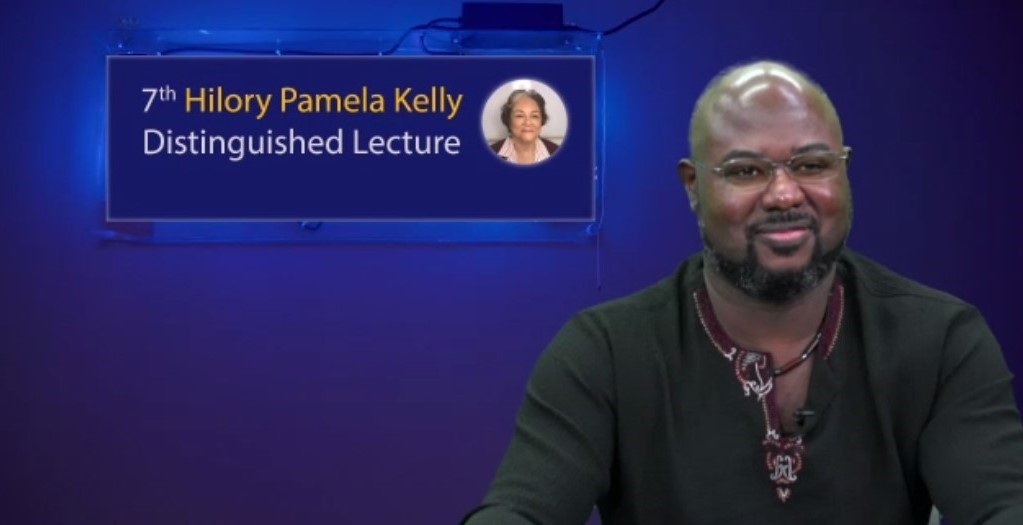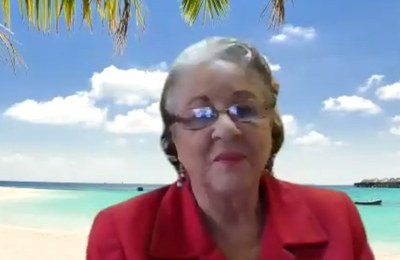Dr Rohan Lewis Confronts the Trials of Writing in 7th H. Pamela Kelly Distinguished Lecture

Guest lecturer, Associate Professor Dr. Rohan Lewis presents the 7th s Hilory Pamela Kelly Distinguished Lecture on February 4th 2021 via the Zoom platform.
Associate Professor of Language, Culture and Society in the School of Humanities and Social Sciences (SHHS), Faculty of Education and Liberal Studies, University of Technology, Jamaica, Dr. Rohan Lewis, delivered the 7th H. Pamela Kelly Lecture on February 4, 2021. In an engaging and provocative presentation titled: “Writing trials; sentencing text: Academic literacy in the era of constant change” Dr. Lewis regaled the virtual audience of more than 100 people who joined via the Zoom platform with an analysis of the language and writing challenges Jamaican students faced and offered recommendations for solving them using aspects of the functional-systemic approach to language and writing.
Dr. Lewis set his thesis against the backdrop of the Jamaican language situation. He argued that the country is ambivalent about its language situation, presenting itself as an English-speaking country while most Jamaicans do not use Standard English for any purpose other than for formal writing. He lamented the fact that this was a context in which students were “expected to develop writing skills in a language they [did not master]” and were “given few or no opportunities to develop writing skills in the one they habitually use[d].”
Dr. Lewis argued further that language and writing education in Jamaica operated on the assumption that English was the country’s default language. He cited research from linguist Dennis Craig dating back to the 1960s that pointed to inadequate resources being placed in teaching English as a second or secondary language and more recent research (2013) by Drs. Clover Jones-McKenzie and Judith Orugn highlighting how students sitting CSEC examinations continue to struggle with the English Language.
The educator and scholar pointed out that “while writing depends on competence in language, that competence is not equivalent to having competence in writing”. In that regard, he reiterated that “the teaching of English is not the teaching of writing” and as such each should optimally be treated separately. Looking beyond Jamaica’s language education situation, Dr. Lewis gave useful insight for language educators on shifting traditional thinking and approaches to teaching the writing process which presupposes students’ capacity to use language. “We fail students by not teaching writing, by [not] bearing the language situation from which they come in mind,” he noted, drawing evidence from annual valedictory addresses which express the frustration experienced by students in writing courses at the University. “This I reckon is a mutually reinforcing frustration,” Dr. Lewis noted, adding that many times students failed to understand what they were doing wrong and were clueless about how to fix their writing problems.
Dr. Lewis noted that tertiary institutions, including UTech, Jamaica, have implemented various intervention strategies to respond to the English language challenges their students face. At UTech, Jamaica, this has included the integration of English proficiency entrance tests and general education modules in Academic Writing. Despite these, however, he noted that long held negative views and prejudices about the country’s native language were stymying efforts to address students’ language and writing deficiencies. He contended that rather than treating Creole-dominant students “as problems that need[ed] fixing,” the education system should view their under preparedness for the English language writing classroom as a matter of the needs of a diverse client base.
Dr. Lewis suggested that remedying the problem did not lie in what he termed a ‘subtractive mentality’ that sought to “get rid of patwa” but in adopting a philosophical position that accounted for Creole-dominant students as second language learners of English. These recommendations, he remarked, all have relevance for policy makers, curriculum developers and educators.
Dr. Lewis gave practical examples of organizing text according to types and genres of writing. He also stressed the importance of using the text styles typical in various academic disciplines to teach students how to write. Dr. Lewis encouraged teachers of writing to guide student writers into becoming familiar with the style of writing typical of their professions. He pointed out, too, that language educators, playing a lead role, should collaborate with content specialist educators in other disciplines to help students achieve the desired level of mastery in writing. He shared that some of these concerns are being integrated into a pilot project being conducted by the LTRC.

Honoree Hilory Pamela Kelly sends greeting to all at the 7th Hilory Pamela Kelly Distinguished Lecture on February 4th via the Zoom platform.
'The H. Pamela Kelly Lecture honours the UTech, Jamaica stalwart whom moderator, Mrs Audene Henry-Harvey noted has been instrumental in improving the English Language competence of students at the University. The annual lecture serves as a celebration of her legacy and provides a space for the presentation of new scholarship in the areas of academic literacy and language education.
Dr. Clover Jones-McKenzie, Head, School of Humanities and Social Sciences, FELS in her welcome remarks also paid tribute to the valuable contribution given by Mrs Kelly who was instrumental in the establishment of the Self-Access Learning Centre, now the Language, Teaching and Research Centre (LTRC) in the Faculty. The LTRC provides enrichment opportunities for the development of language and academic literacy skills among students at the University.
Dean of the Faculty, Professor Shermaine Barrett and subsequent speakers on the programme all further echoed words of gratitude to the distinguished educator who has contributed significantly to the development of literacy education and the development of the Faculty of Education and Liberal Studies and the wider University.
Mrs. Kelly in her well-known charming and witty style, who appeared on camera against the digital backdrop of a sunny beachscape, thanked the Faculty’s leadership, programme organisers and Zoom for bringing persons together for the 7th renewal of the lecture in her honour, even while she and others heeded safety precautions to ‘tan a yu yaad.’ “I am happy that the Faculty of Education and Liberal Studies and the School of Humanities and Social Sciences continue to lend support to this lecture which is such an effective platform for the dissemination of progressive ideas on the teaching and learning of languages,” she noted in her graceful appreciation to all.
Vice-Dean, FELS, Dr. Harold McDermot in introducing the guest lecturer, spoke of Dr. Lewis’ eminent teaching career at both the undergraduate and graduate levels in courses in media writing and culture, translation theory, discourse analysis, academic writing and Jamaican English, French and Spanish languages. Dr. Lewis, who is a former Dean of FELS, has been coordinator of CAT Productions – the in-house media production agency linked to the Bachelor of Arts in Communication Arts and Technology (BACAT) in FELS since January 2020. Dr. Lewis’ recent publications include, Beyond the Scribal Cannon, “Reinserting Caribbean Vernacular Text into Theory” published in the volume – Teaching, Reading and Theorizing Caribbean Text (Lexington Press 2020) and Gender Variations and Sexual Diversity in the Caribbean: Perspectives, Histories, Experiences (co-edited with Marjan de Bruin, UWI Press 2020). He holds a PhD in Linguistics with a specialisation in Translation from the University of Montreal, Canada, and an MA in Translation and a BA in Mass Communication from the UWI, Mona.
Dr. Warrick Lattibeaudiere, Head, LTRC and chairman of the lecture’s organising committee in moving the vote of thanks, thanked all for their contribution in hosting a successful lecture, ahead of a spirited discussion among the online audience drawn from academia and the public and private sectors.
End.
Contact:
Michelle Beckford (Mrs.)
Corporate Communications Manager
University of Technology, Jamaica
Telephone: 876 970-5299
Email: mbeckford@utech.edu.jm
